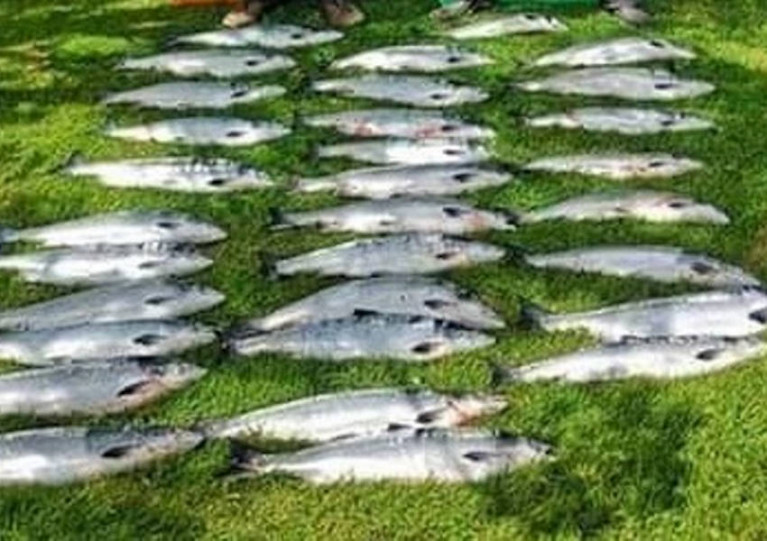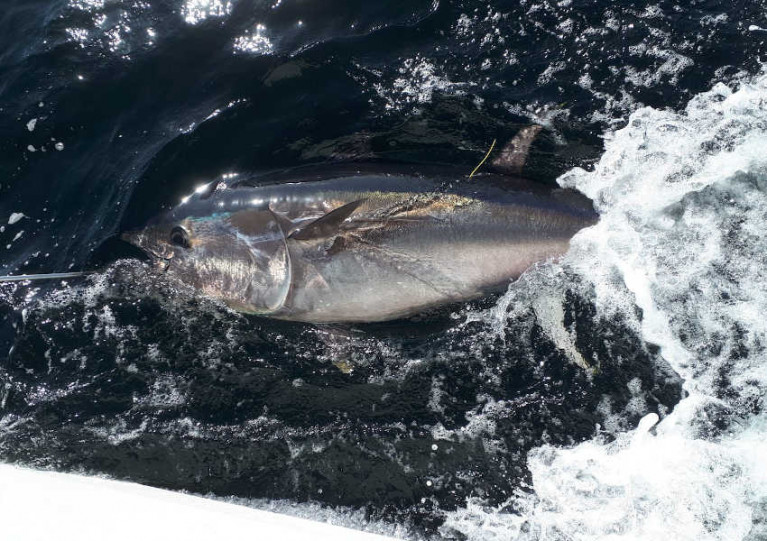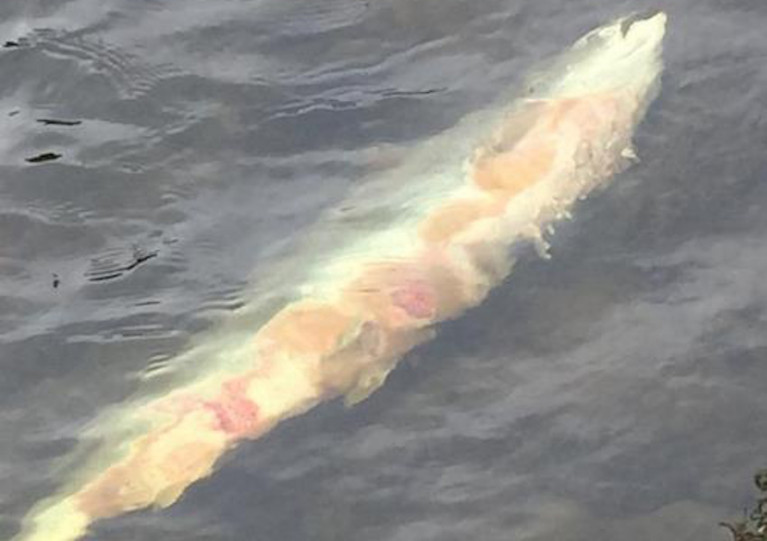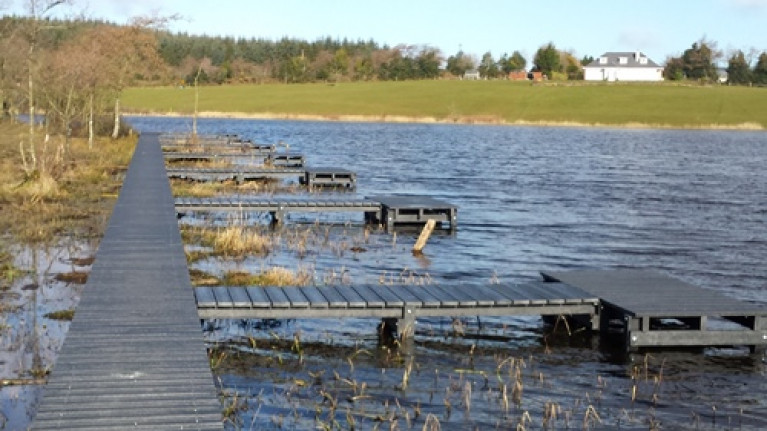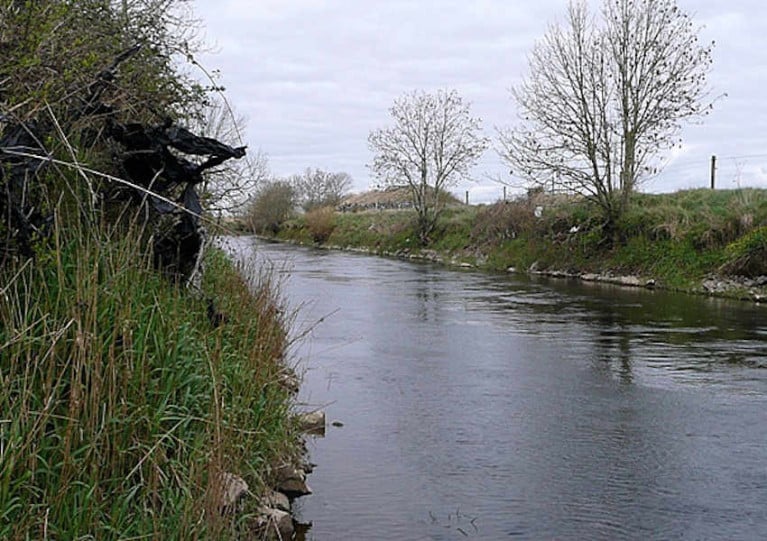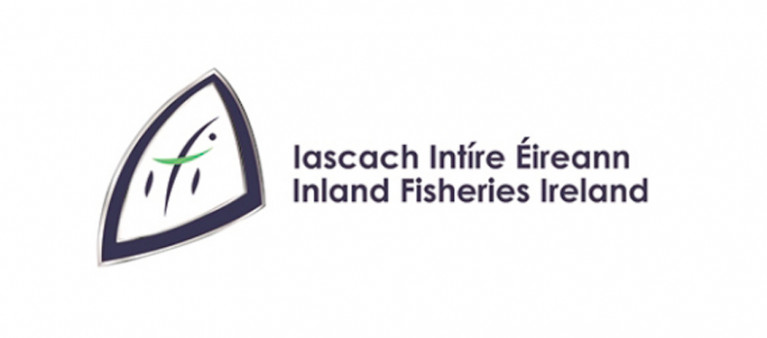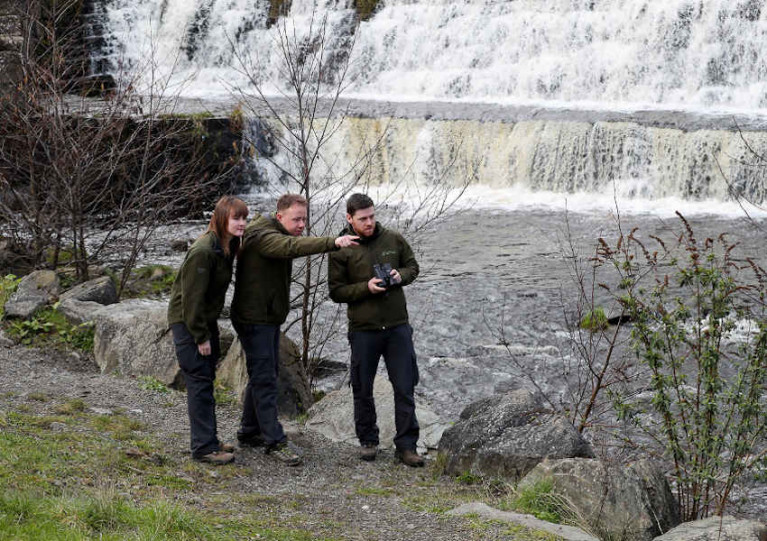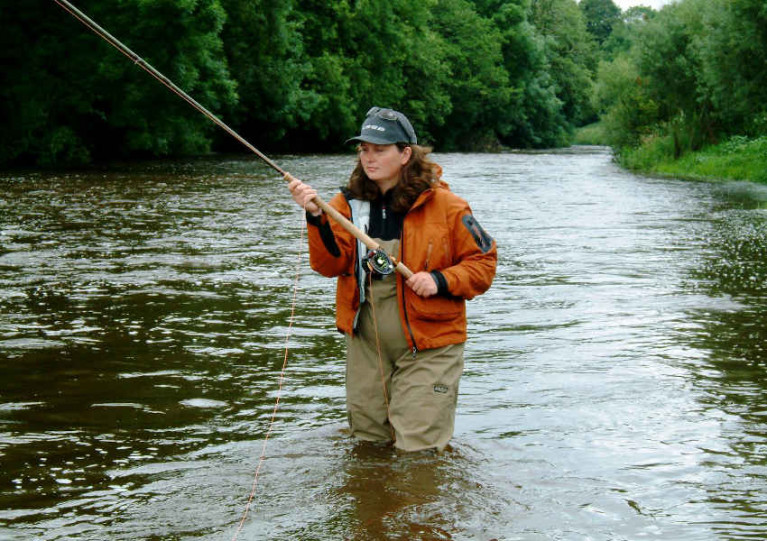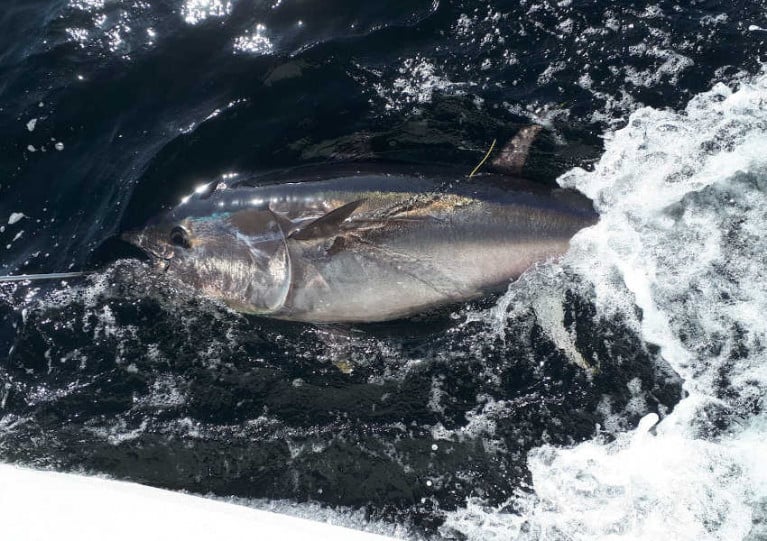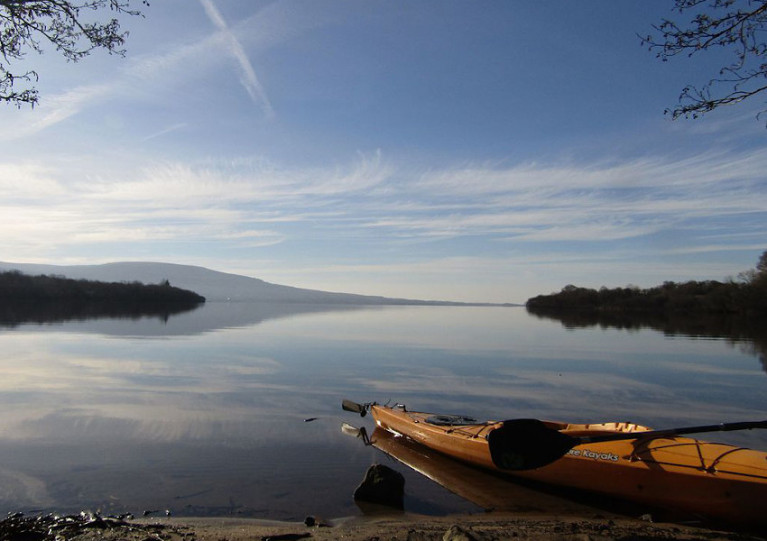Displaying items by tag: Inland Fisheries Ireland
The hospitality industry and general public alike have been reminded not to purchase illegally caught salmon or sea trout after illicit nets were seized on a fishing boat off Cork last week.
Fisheries protection officers with Inland Fisheries Ireland (IFI) boarded the vessel off the Cork coast last Monday 13 July on which they seized 98kg of salmon and 256 metres of illegal net.
IFI notes that the incident was one of several that took place earlier this month, with similar seizures in Donegal and Mayo.
“The risk of targeted netting of salmon at sea remains the highest priority for our protection staff, who have seized 15 nets in the South Western River Basin region so far this season,” said IFI’s deputy chief executive Dr Greg Forde.
Only salmon or sea trout that have been caught by licensed commercial salmon fishermen may be sold to the public and hospitality industry, and must bear a colour coded green or white gill tag — or for wild imported salmon, a yellow tail tag.
Anglers are prohibited from selling any salmon or sea trout caught by rod and line. In addition, rod-caught salmon must have a blue tag affixed, IFI added.
Fisheries officers carry out regular inspections of premises to deter the illegal trade of salmon and sea trout. Reports of suspected illegal activity can also be made directly to IFI staff or on the confidential hotline at 1890 34 74 24 or 1890 FISH 24.
Twenty-two charter angling vessels have been granted authorisation to participate in a bluefin tuna data collection programme after a successful pilot last year.
The Tuna CHART (CatcH And Release Tagging) programme will see skippers catch, tag, measure and release Atlantic bluefin tuna for data collection purposes off the Irish coast.
The authorised vessels, which are located in Cork, Clare, Galway, Sligo and Donegal, will support an international scientific programme to increase knowledge of the behaviour and abundance of bluefin tuna in Irish waters and across its distribution generally.
Atlantic bluefin tuna, the largest tuna in the world, frequent Irish coastal waters to feed during the species’ annual migration through North Atlantic waters.
The bluefin tuna is prized by sea anglers for its power and fighting ability and is a very valuable commercial species, though there is currently no sport or commercial fishery for bluefin tuna in Ireland.
The new programme, which has been developed by Inland Fisheries Ireland and the Marine Institute in partnership with the Sea Fisheries Protection Authority and the former Departments of Agriculture, Food and the Marine, and Communications, Climate Action and Environment, will operate again in 2020 having commenced on a pilot basis in 2019.
Eamon Ryan TD, minister with responsibility for inland fisheries, said: “The 22 angling vessels authorised by my department, increased from 15 last year, will contribute substantially to essential bluefin tuna data collection as they migrate along the Irish coastline.
“The recreational fisheries sector is crucial in the delivery of this research programme and we look forward to continue working with all the State agencies involved.
“I want to acknowledge the key role of the authorised charter skippers and their crews who are bringing their unique expertise to bear on providing valuable data for scientific purposes, and the ‘citizen scientist’ anglers who will catch the fish. The fact that 209 fish were tagged last year with no mortalities is a great achievement by the skippers.”
The Sea Fisheries Protection Authority and Inland Fisheries Ireland will undertake inspections and patrols around the coast to ensure this remains a strictly controlled programme.
A full list of authorised skippers can be found at www.fisheriesireland.ie/bluefin
Inland Fisheries Ireland (IFI) says it has recently received reports that individual fresh-run wild salmon have been encountered in the River Leannan, Co Donegal and River Corrib in Co Galway displaying suspected signs of red skin disease (RSD).
Low incidences of this disease were first documented in 2019 in several European salmon stocks. In the past few weeks, suspected cases have again been reported in small numbers of returning salmon in Denmark, Norway and Scotland.
In Ireland last year, suspected incidences of RSD were reported in 56 salmon from 17 rivers throughout the country. The majority of these reports were in June and July with only single incidences reported prior to and after this time.
Salmon affected by RSD have a characteristic red-spotted rash on their underbelly and may appear lethargic or moribund. The rash can either be localised or extend along some or most the length of the fish.
As the disease progresses, skin lesions, signs of bleeding and skins ulcers can develop primarily along the belly area and extend to the head and tail. Secondary fungal infection can further develop which may ultimately result in death of the salmon.
Within the operational constraints imposed by the Covid-19 National Public Health Emergency, IFI staff are continuing to liaise with the Fish Health Unit in the Marine Institute and international colleagues to monitor and respond to the situation.
As part of this, where practicable, anglers and fishery owners are asked to report any incidences of salmon with signs of RSD to IFI to help determine the occurrence of the disease nationally.
Anglers who capture such salmon are advised to follow normal biosecurity procedures and disinfect tackle, waders and equipment.
Until the cause of the disease has been determined and the risk of spreading the disease established, affected salmon should not be removed from the water.
Dr Paddy Gargan, senior research officer at IFI, said: “We are asking anglers and fishery owners to remain vigilant and report any catches of salmon with signs of this disease to us as soon as possible within the constraints imposed by the Covid-19 National Public Health Emergency.”
Anglers are asked to forward any reports of salmon with signs of RSD along with photographs and an estimate of fish weight to [email protected] or call IFI’s 24 hour confidential hotline number on 1890 34 74 24 or 1890 FISH 24.
RTÉ News reports that anglers are returning to many of Ireland’s most popular fisheries since the first easing of Covid-19 restrictions.
Since this past Wednesday 6 May, as announced by Inland Fisheries Ireland, anglers may fish from riverbanks within 5k of home on most State fisheries (except Galway and Moy) as well as ESB fisheries, provided they observe social distancing protocols.
Boat anglers are subject to RNLI safety guidelines, which currently recommend avoiding the water for any recreational activities.
The National Coarse Fishing Federation told RTÉ News it hopes for a co-ordinated cross-border approach “to opening up our sport” in the coming months, amid fears for the health of the angling tourism industry which remains shut down.
Minister Welcomes Formal Partnership Between IFI & Cairde Na Chláir For Conservation Efforts On Clare River
Sean Canney, Minister of State with responsibility for the inland fisheries sector, has welcomed the signing of a memorandum of understanding (MOU) between Inland Fisheries Ireland (IFI) and Cairde na Chláir, representing four of its member angling clubs on the Clare River.
The MOU will enable both parties to collaborate on the conservation and development of brown trout and salmon and their habitat on the Clare River.
Commenting on the significance of the partnership, Minister Canney said: “I fully support the signing of this MOU which represents the formalisation of a long standing collaborative relationship between Inland Fisheries Ireland and the Cairde na Chláir.
“This partnership is significant not just for the two organisations but for the Western River Basin District and the MOU will act as the motivation to develop the five year plan but also to further incentivise future collaborations and projects”.
IFI says this MOU is a declaration of a commitment from both parties to the development of a five-year plan that is focused on the conservation and development of brown trout and salmon and their habitat on the Clare River in the Western River Basin District.
It will enable a closer working relationship between both parties and recognises that conservation of the species and its habitat as the core guiding principle of this relationship, the inland fisheries body added.
The MOU was signed by Richard Jordan on behalf of the Cairde na Chláir and co-signed by the participating angling clubs and Suzanne Campion, IFI’s head of business development.
Due to current public health measures, parties will commence work on meeting the objectives of the MOU via virtual meetings.
IFI chief executive Dr Ciaran Byrne said: “During a time when we see the changes to our natural environment from the impact of climate change, this partnership agreement will work to ensure a plan is formed to maximise sustainable benefit for the species.”
He added: “Both parties hold the value of conservation and development of fisheries at the core of their organisation. We look forward to working with the clubs that comprise the Cairde na Chláir, learning from one another and developing joint initiatives at a time when collaborative work is critical for the future of our fisheries resource.”
Richard Jordan, on behalf of the Cairde na Chláir, said: “We welcome the signing of this MOU between clubs of Cairde na Chlair and Inland Fisheries Ireland to begin the process of creating a five year plan for the conservation and development of our brown trout and salmon.
“The Cairde na Chláir clubs involved in this MOU are the Milltown Anglers, Cregmore Athenry Anglers, St Colmans Anglers and the Tuam Anglers Association. The formalisation of this MOU marks an important consolidation of our working relationship with Inland Fisheries Ireland.”
Inland Fisheries Ireland Issues Statement On Covid-19 Response
In a statement issued yesterday evening (Wednesday 18 March), Inland Fisheries Ireland confirmed measures it has put in place in response to the ongoing Covid-19 pandemic emergency.
“Following the HSE and the Government’s advice in relation to the delay of Covid-19, Inland Fisheries Ireland (IFI) has put in place a number of measures to maximise our capacity to continue to deliver our business and statutory services to the public,” the angling authority said.
“All main River Basin District (RBD) offices remain open with a minimum staff complement. IFI strongly encourages the public to engage with IFI using email, telephone and letter.
“IFI has requested that office-based staff, if possible, work from home. In the circumstances, there may be delays in replying to queries.”
It added: “IFI field staff continue normal operations bearing in mind current HSE advice. IFI staff may attend meetings remotely only (e-meetings, conference calls etc).
“Those wishing to purchase licences or permits, pay bills or undertake other financial transactions with IFI are requested to do so online, via telephone, bank transfer or by post.
“IFI has a 24-hour confidential hotline (1890 34 74 24 or 1890 FISH 24) through which members of the public may report incidents of illegal fishing, water pollution and invasive species which will continue to operate.”
Meanwhile, in the north of the lsland, Loughs Agency offices, including the Riverwatch Aquarium in Derry, were closed to the public from 5pm last Friday evening (13 March).
“The majority of services delivered by the agency will continue, particularly those undertaken in open spaces such as fishery protection patrols,” the cross-border body said.
“Anglers can continue to purchase fishing licences online or over the telephone +44 2871 342100.
“Anglers are also advised that the forthcoming North West Angling Fair, due to take place on 4-5 April, has been cancelled.”
Inland Fisheries Ireland (IFI) has launched its 2020 recruitment campaign for seasonal fisheries officers nationwide.
The positions will see the successful applicants support the development and protection of Ireland’s angling resource during the summer period.
There are numerous roles available across six operational districts on a six-month basis, with contracts commencing from Monday 11 May and training provided to all new recruits.
Interviews will take place on Wednesday 1 and Thursday 2 April. The locations for the new positions will be based across the country in the following IFI districts:
- Eastern River Basin District: Drogheda, Co Louth; Virginia, Co Cavan; Kilcoole, Co Wicklow
- South Eastern River Basin District: Carrick on Suir, Co Tipperary; Enniscorthy, Co Wexford
- South Western River Basin District: Kenmare, Co Kerry
- Shannon River Basin District: Listowel, Co Kerry; Limerick, Co Limerick; Lough Sheelin, Co Cavan; Clare, Co Clare
- Western River Basin District: Galway, Co Galway; Bangor, Co Mayo; Ballina, Co Mayo
- North Western River Basin District: Letterkenny, Co Donegal; Ballyshannon, Co Donegal; Clady Crolly, Gweedore, Co Donegal; Cavan, Co Cavan
IFI chief executive Dr Ciaran Byrne said: “I am delighted to invite applications for these seasonal positions which will support the ongoing conservation, maintenance and protection of the fisheries resource.
“These fisheries officers will play a critical role in developing, protecting and conserving Ireland’s precious natural fisheries resource and this additional support on the ground during the busy summer period is vital.”
Roisin Bradley, head of HR at IFI, added: “We are looking for applicants who are passionate about developing and protecting our fisheries resource, have an appreciation for the natural environment and who have excellent interpersonal skills.
“Our fisheries officers are at the heart of the work which we do as custodians of this precious resource and we look forward to welcoming the new members to our team in the spring.”
The closing date for applications is Monday 16 March. To find out more about the roles and how to apply, visit the IFI careers page HERE.
Open Call For Women To Try Angling At Events Throughout 2020
Inland Fisheries Ireland (IFI) will be running a number of events to give women the opportunity to try angling in 2020.
Renowned angler Glenda Powell, one of the world’s leading fly-casting instructors, has partnered with IFI to teach the participants around various venues in Ireland from April to September of this year.
The aim of the programme is to give women an opportunity to try fishing in a relaxed and supportive environment with other beginners.
Each participant will be concentrated on as an individual and the aim is to develop her own personal requirements during the programme to enable learning.
The course will be a mixture of spinning and fly fishing to ensure that each participant gets to experience a variety of fishing methods while figuring out what method works best for them.
Participants will be encouraged to progress at their own rate of learning while feeling safe in or around water. Each participant will learn a new skill and be in the outdoors and will hopefully develop an interest to continue with the sport.
Those wishing to progress to the next level in learning to fish will be encouraged to sign up to future programmes and also to join local angling clubs.
Each course will consist of a half-day session either in the morning (9.30am–1.00pm) or afternoon (2pm-5.30pm) on Saturdays at the following dates and locations:
- River Blackwater, Cork: 4 & 18 April, 16 & 30 May
- River Moy, Mayo: 6 & 20 June, 18 & 25 July
- River Shannon, Limerick: 22 & 29 August, 5 & 12 September
Suzanne Campion, head of business development at IFI, said: “We are delighted to be able to offer this pilot programme to women as an opportunity to not only learn fishing but have the chance to develop a new skill and past time.
“In today’s society, outdoor recreational activities are more important than ever from a health and well-being perspective and in Ireland, we are uniquely placed with the breadth and quality of our fisheries resource which is available to all to enjoy.
“We want to give these women a unique opportunity to be able to try out this sport in a relaxed and supportive environment among some of our greatest natural resources here in Ireland.”
The programme is open to all women aged 18 and over. Booking is essential as there are a limited number of spaces. If you are interested in taking part or would like more information, click HERE.
Building on the success of last year’s Tuna CHART (CatcH And Release Tagging) pilot programme, a bluefin tuna research catch-and-release fishery for Ireland will operate in 2020.
A maximum of 25 authorisations may be granted to qualifying angling charter vessel skippers around the Irish coast for this fishery which will open on Wednesday 1 July and close on Thursday 12 November, without exception.
And depending on the successful operation and review of this year’s fishery, it is intended that a scientific catch and release fishery may also operate in 2021 and 2022.
Atlantic bluefin tuna, the largest tuna in the world, frequent Irish coastal waters to feed during its annual migration through North Atlantic waters. The bluefin tuna is prized by sea anglers for its power and fighting ability and is a very valuable commercial species.
The Tuna CHART programme is a collaborative scientific programme between Inland Fisheries Ireland (IFI) and the Marine Institute in partnership with the Sea Fisheries Protection Authority, the Department of Agriculture, Food and the Marine (DAFM) and the Department of Communications, Climate Action and Environment (DCCAE).
In 2019, the Tuna CHART pilot programme authorised 15 charter skippers to operate a scientific fishery, in which anglers participated fully, to catch, tag and release bluefin tuna.
These professional skippers were trained to tag, measure and record bluefin data and over the course of the 2019 three month season, 219 bluefin tuna were caught, tagged and released. As many as eight bluefin were tagged on one fishing trip.
All tuna were carefully handled subject to strict guidelines set by the Tuna CHART programme and all were released alive. Data from the tagging programme are being collated by the partnership for reporting to the International Commission for the Conservation of Atlantic Tuna (ICCAT).
As with the pilot programme, this year’s authorised skippers will be required to have high specification rods, reels and line in advance of the open season in order to bring the fish alongside in a timely manner. Skippers will be required to collect data on every bluefin trip undertaken and each bluefin tuna they catch, tag and release.
A call for applications for the 2020 fishing season will be announced next Tuesday 18 February and the last date for the receipt of a completed application will be 1pm on Friday 6 March.
Shannon Navigation Advisory Over Fisheries Survey Nets On Lough Allen
Waterways Ireland advises all masters of vessels and water users that Inland Fisheries Ireland (IFI) will be placing fisheries survey nets on Lough Allen from today, Tuesday 21 January to this Thursday 23 January.
The nets will be in the waterway during daytime and night-time and will be marked with buoys.
Vessels in this part of the Shannon Navigation should proceed with additional caution during this period.

